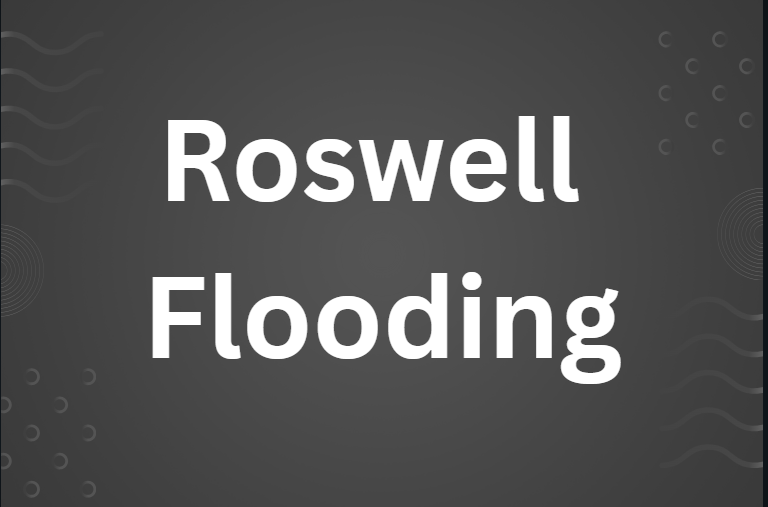Flooding is one of the most damaging natural disasters that can strike any city. In recent years, Roswell has faced several flooding incidents that have affected homes, roads, and local businesses. This article explains everything about Roswell flooding, including its causes, effects, safety tips, and frequently asked questions.
What is Roswell Flooding?
Roswell flooding refers to the overflow of water in the Roswell area, mainly caused by heavy rain, storms, or poor drainage systems. When the ground becomes too soaked to absorb more rain, water starts collecting on streets, fields, and in neighborhoods. This can lead to dangerous situations and serious property damage.
Flooding in Roswell can be either flash flooding, which happens suddenly after intense rain, or river flooding, which occurs when rivers and creeks overflow due to continuous rainfall.
Main Causes of Flooding in Roswell
There are several reasons why flooding happens in Roswell. Understanding these causes helps people stay prepared and safe.
1. Heavy Rainfall
When Roswell experiences long or intense rainfall, the water builds up faster than it can drain away. This often causes flash floods in low-lying areas.
2. Poor Drainage Systems
Blocked or old drainage systems can stop water from flowing properly. This makes rainwater collect on roads and near houses, especially in older parts of the city.
3. Urban Development
As more buildings and roads are built, natural land that absorbs rain gets replaced by concrete. This means less water gets soaked into the ground, leading to higher flood risks.
4. River Overflow
The Chattahoochee River and smaller creeks around Roswell can overflow after long periods of rain. This causes nearby lands to flood.
5. Climate Change
Changing weather patterns bring stronger and more unpredictable storms. As a result, Roswell may see more frequent and intense floods in the future.
Areas Most Affected by Roswell Flooding
Certain neighborhoods and roads in Roswell are more prone to flooding than others. These areas are usually close to rivers, creeks, or low lands. Some commonly affected areas include:
- Riverside Road and Azalea Drive near the Chattahoochee River
- Old Alabama Road and Holcomb Bridge Road
- East Roswell Park areas
- Neighborhoods near Big Creek
Residents living in these areas should stay alert during heavy rain warnings.
Impact of Flooding on Roswell
Flooding causes many types of damage — not just to property, but also to safety, health, and the local economy.
1. Property Damage
Homes, cars, and shops can be damaged by floodwaters. Basement flooding and roof leaks are very common during these events.
2. Road and Traffic Problems
Flooded roads make it hard for people to travel or reach work. Police often close roads to prevent accidents during floods.
3. Health Risks
Floodwater can mix with sewage or chemicals, spreading bacteria and diseases. Standing water also becomes a breeding ground for mosquitoes.
4. Economic Loss
Businesses in Roswell often suffer during floods, especially small shops that depend on daily customers. The cleanup and repair costs can be very high.
How Roswell Manages Flooding
The City of Roswell and local emergency teams work hard to reduce flood risks. Some of their steps include:
- Improving drainage systems and cleaning storm drains regularly.
- Building flood barriers and levees near riverbanks.
- Updating flood maps to show danger zones.
- Running awareness programs for residents to prepare for emergencies.
Roswell’s public works department also encourages people to report blocked drains and follow emergency alerts during bad weather.
🛟 Safety Tips During Roswell Flooding
Flooding can be scary, but simple safety steps can help protect you and your family.
Before Flooding
- Keep an emergency kit with water, food, flashlight, and medicines.
- Know the flood-prone areas near your home.
- Move valuables and electronics to higher places.
During Flooding
- Avoid driving through flooded roads. Even a few inches of water can move a car.
- Stay inside your home unless you are told to leave.
- Keep away from power lines and flooded electrical equipment.
After Flooding
- Wait until officials say it’s safe to return home.
- Do not drink tap water until it’s declared safe.
- Wear gloves and boots when cleaning up flooded areas.
How to Prevent Future Flooding in Roswell
Prevention is always better than repair. Here are some simple steps residents and city officials can take to reduce future flooding:
- Plant more trees and grass to absorb rainwater.
- Avoid littering or throwing trash in drains.
- Build rain gardens or use permeable pavements in homes.
- Support city projects that improve stormwater management.
FAQs
Q1. How often does Roswell experience flooding?
Flooding in Roswell can happen a few times a year, especially during spring and summer storms. However, the severity depends on rainfall and local conditions.
Q2. What should I do if my home is in a flood zone?
You should buy flood insurance, prepare an emergency plan, and keep your valuables at higher levels. Stay alert for weather alerts and be ready to evacuate if needed.
Q3. Is Roswell improving its flood control systems?
Yes. The city has been upgrading its drainage systems, cleaning storm drains, and working on flood prevention projects to protect residents.
Q4. Can floods in Roswell be predicted?
While no one can predict exact flood times, weather forecasts and flood alerts help people prepare in advance. Always check local news or city updates during heavy rains.
Q5. What is the best way to stay safe during floods?
The best way to stay safe is to avoid floodwaters, follow evacuation orders, and listen to official alerts. Never walk or drive through deep water.
Conclusion
Flooding Roswell is a serious issue that affects lives, homes, and businesses. While the city continues to improve its flood control systems, residents also play a big role by staying prepared and alert. By understanding the causes and taking preventive steps, Roswell can reduce the damage and stay safer during future storms.

